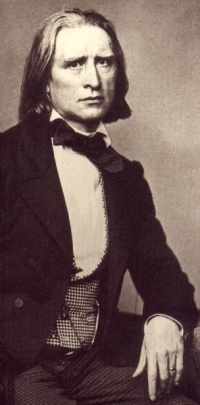Franz Liszt
 Franz Liszt (Hungarian: Ferencz Liszt, in modern usage Ferenc Liszt, from 1859 to 1865 officially Franz Ritter von Liszt) (October 22, 1811 - July 31, 1886) was a Hungarian composer, virtuoso pianist and teacher. He was also the father-in-law of Richard Wagner. In 1865 he became abbot in the Roman Catholic Church.
Franz Liszt (Hungarian: Ferencz Liszt, in modern usage Ferenc Liszt, from 1859 to 1865 officially Franz Ritter von Liszt) (October 22, 1811 - July 31, 1886) was a Hungarian composer, virtuoso pianist and teacher. He was also the father-in-law of Richard Wagner. In 1865 he became abbot in the Roman Catholic Church.Liszt became renowned throughout Europe during the 19th century for his great skill as a performer. He was said by his contemporaries to have been the most technically advanced pianist of his age and perhaps the greatest pianist of all time. He was also an important and influential composer, a notable piano teacher, a conductor who contributed significantly to the modern development of the art, and a benefactor to other composers and performers, notably Richard Wagner, Hector Berlioz, Camille Saint-Saens, Edvard Grieg and Alexander Borodin.
As a composer, Liszt was one of the most prominent representatives of the "Neudeutsche Schule" ("New German School"). He left behind a huge and diverse body of work, in which he influenced his forward-looking contemporaries and anticipated some 20th-century ideas and trends. Some of his most notable contributions were the invention of the symphonic poem, developing the concept of thematic transformation as part of his experiments in musical form and making radical departures in harmony.
 Franz Liszt Latest Sheets Feed
Franz Liszt Latest Sheets Feed Franz Liszt Latest Requests Feed
Franz Liszt Latest Requests Feed
Advertisement
Advertisement
Total 1619 sheet(s) found, listing between 1580 - 1600.
| Song | Added By | Pages | Instruments | Sheet Type | File |
| Hungrian Rhapsody No.1 |
mirza (101)
5345d ago
|
18 | Piano | Original |
|
| Hungarian Rhapsody No 2 |
LHSwimmer04 (5)
5346d ago
|
18 | Piano | Original |
|
| FF10 - Otherworld |
iinverse (4)
5346d ago
|
5 | Piano, Guitar | Original |
|
| Fithos Lusec Wecos Vinoces |
iinverse (4)
5346d ago
|
4 | Piano | Original |
|
| FF8 - Successor |
iinverse (4)
5346d ago
|
6 | Piano | Transcription |
|
| suteki da ne |
finalband (7)
5348d ago
|
3 | Violin | Original |
|
| Boundless Ocean |
aquaadragon (7)
5356d ago
|
2 | Piano, Flute | Transcription |
|
| symphony no. 5 in c minor, op. 67 |
unitedjosie (8)
5363d ago
|
42 | Piano | Other |
|
| cadenza 2 hungarian rhapsody |
schroeder (11)
5371d ago
|
3 | Piano | Original |
|
| Aeris Theme |
Wisdoms_Wind (2)
5373d ago
|
1 | Flute | Transcription |
|
| Tifa No Theme |
Wisdoms_Wind (2)
5373d ago
|
1 | Flute | Transcription |
|
| Tifa's Theme |
athiskemon (12)
5373d ago
|
4 | Piano | Transcription |
|
| Areis' Theme |
athiskemon (12)
5373d ago
|
4 | Piano | Other |
|
| Piano Transcription of Beethoven's 9th |
gortfather (2)
5375d ago
|
88 | Piano | Original |
|
| aerith's theme |
zircail (1)
5377d ago
|
3 | Piano | Transcription |
|
| Tifa's Theme |
swtladyy16 (2)
5378d ago
|
3 | Piano | Transcription |
|
| melodies of life |
swtladyy16 (2)
5378d ago
|
4 | Piano | Transcription |
|
| suteki da ne |
ffrreeddoo (1)
5382d ago
|
1 | Violin | Original |
|
| Waltz De Chocobo |
robopenguin (1)
5385d ago
|
4 | Piano | Original |
|
| One Winged Angel |
Dramaturge (2)
5396d ago
|
8 | Piano | Transcription |
|

